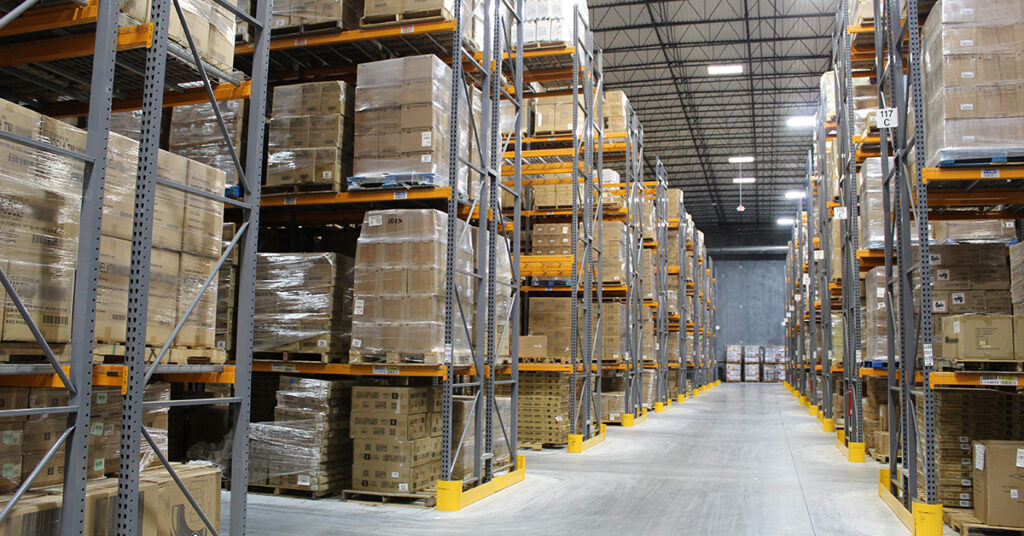Unlike specialized storage solutions, ambient warehousing offers the flexibility to accommodate a wide range of goods, from dry food products to electronics, without the need for costly climate control systems.
What is Ambient Storage?
Ambient storage refers to the storage of products in a non- or minimally temperature-controlled environment. Instead of relying on specialized heating or cooling systems, ambient warehouses maintain stable room temperature conditions through passive means such as insulation, ventilation, and natural heat exchange. This type of storage is a cost-effective solution commonly used for products that do not require temperature-controlled environments.
Ambient Warehouse Conditions
Ambient warehouse conditions are characterized by stable room temperature environments typically ranging between 55°F and 85°F (temperature data from Beyond Warehousing’s Kansas City-area ambient warehouses), without the need for active heating or cooling systems. However, most ambient facilities still use passive or limited methods for regulating the environment.
These warehouses are designed to allow for the natural exchange of air between the interior and exterior, facilitating the removal of excess heat and moisture while promoting airflow throughout the facility. Airflow can be controlled using a combination of methods including exhaust fans, dampers, ceiling fans, etc. While ambient warehouses typically do not have specialized heating systems, many are equipped with small heaters in case they are needed to keep the facility above freezing temperatures.
Ambient vs Temperature-Controlled Warehousing
Infrastructure requirements for ambient warehouses are generally less complex compared to temperature-controlled facilities. Instead of installing climate control equipment, ambient warehouses focus on efficient layout designs, adequate ventilation, and insulation to maintain stable room temperature conditions.
Temperature-controlled storage facilities precisely regulate and maintain specific temperature ranges. Air-conditioned warehouses typically maintain temperatures between 56°F and 75°F, while refrigerated and frozen warehouses will maintain much cooler temperature ranges to accommodate perishable goods, such as fresh or frozen meat, produce, and dairy products.
What Products are Suitable for Ambient Storage?
A wide range of non-perishable goods are suitable for ambient storage, making it a versatile solution for various industries. Some examples of products well-suited for ambient storage include:
| Example Product Category | Specific Client Products |
| Dry Food Products | Grains, Spices, Canned Food, Boxed Meals, Bottled Sauces, Packaged Snacks |
| Beverages (non-alcoholic) | Bottled Flavored Water, Canned Flavored Coffee |
| Personal Care Products | Shampoo, Soap, Toothpaste |
| Household Cleaning Supplies (non-hazardous) | Detergents, Sponges, Trash Bags |
| Pet Supplies | Pet Food, Toys, Grooming Products, Accessories |
| Office Supplies | Paper Products, Pens, Stationary |
| Textiles | Clothing, Linens |
| Household Cleaning Supplies (non-hazardous) | Detergents, Sponges, Trash Bags |
| Electronics | Laptops, Components, Accessories, Small Appliances |
| Tools and Hardware | Power Tools, Accessories |
| Automotive Supplies | Parts, Accessories, Care Products |
| Toys and Games | Board Games, Consoles, Accessories |
The Role of Ambient Storage
Cost-Effectiveness: Businesses utilizing ambient storage can reduce operational costs associated with energy consumption and maintenance.
Reduced Environmental Impact: Storing suitable products in an ambient environment minimizes energy consumption and emissions associated with climate control systems, contributing to environmental sustainability efforts.
Considerations for Ambient Storage in 3PL Warehousing
Suitability of Products: While ambient storage is ideal for non-perishable goods like clothing, electronics, and dry goods, it may not be suitable for temperature-sensitive or perishable items.
Temperature Fluctuations: Unlike temperature-controlled storage options, ambient storage relies on maintaining stable room temperature conditions without active heating or cooling. While ambient warehouses strive to maintain consistent temperatures, external factors such as seasonal changes or geographical location may result in slight fluctuations. Businesses should be aware of these temperature variations and assess their potential impact on product quality and storage requirements when opting for ambient storage.
3PL Warehouse Location: Several factors related to the geographical location of a 3PL warehouse, including climate, temperature variations, and humidity levels, can impact its ambient conditions. Warehouses situated in regions with mild, temperate climates may offer more consistent ambient conditions compared to those located in areas prone to extreme temperature fluctuations or high humidity levels.
By carefully considering the ambient conditions of potential warehouse locations, businesses can ensure optimal product storage conditions and mitigate the risk of environmental factors affecting product quality.
Special Considerations for an Ambient Food Storage Warehouse
Warehouse Management System (WMS): Lot/Batch Tracking
A robust Warehouse Management System (WMS) with lot/batch tracking capabilities is essential for managing inventory and ensuring traceability of food products. This system allows for accurate tracking of product lots or batches from receipt to distribution, enabling quick identification and retrieval in the event of a product recall or quality issue.
Food Grade Certification
Food-grade certification, such as BRCGS, SQF, or ISO 22000, signifies that the 3PL warehouse has implemented robust food safety management systems, sanitation practices, and quality control measures to ensure the safe handling and storage of food products. Warehouses holding these certifications must also undergo regular audits from certification bodies, such as AIB International.
FDA and USDA Registration
A reputable 3PL warehouse storing food products should be registered with the Food and Drug Administration (FDA) and the United States Department of Agriculture (USDA). FDA registration ensures compliance with federal regulations governing food safety, while USDA registration may be required for certain types of food products.
cGMP, HACCP, and FSMA Compliance
Compliance with regulatory requirements, including Good Manufacturing Practices (cGMP), Hazard Analysis and Critical Control Points (HACCP), and the Food Safety Modernization Act (FSMA), are critical for maintaining food safety and quality standards. Choosing a 3PL warehouse that is compliant with these regulations helps mitigate the risk of foodborne illnesses and ensures that food products are handled and stored following industry best practices.
Traceability, Recall & Crisis Management
An effective traceability, recall, and crisis management system is essential for promptly identifying and addressing food safety issues or product recalls. The 3PL warehouse should have procedures in place to trace the movement of food products throughout the supply chain, facilitate rapid recall procedures if necessary, and effectively manage crisis situations to minimize potential harm to consumers and brand reputation.
Beyond Warehousing – a Kansas City Ambient Warehouse Solution
Beyond Warehousing is a 3PL warehousing company with over a million square feet in the Kansas City metro area. As a logistics hub, Kansas City offers strategic proximity to major markets and transportation networks. Additionally, the region’s mild climate offers a unique advantage, allowing more predictable ambient warehouse temperatures.



